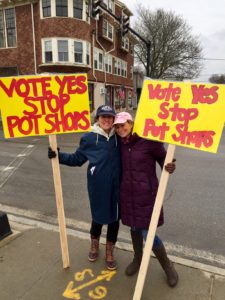 Commercial Recreational Marijuana Opt-Out Action Plan
Commercial Recreational Marijuana Opt-Out Action Plan
UPDATE May 13, 2018: It is becoming increasingly important to act quickly if your community wants any measure of local control over commercialized, recreational marijuana establishments. The temptation to ban just retail establishments and to allow cultivation and testing is to be avoided.
If it is believed that the sale of this drug is in not keeping with your prevention goals and in conflict with the character of your community, then it is hypocritical to allow it to be grown and taxed in your community and then exported for sale to your neighbors. The pot lobby is actively promoting and over promising possible tax benefits. Oversupply in Oregon has caused a dramatic price collapse. [“How do you move mountains of unwanted weed?”] Taxes are tied to revenue which is tied to price. As prices collapse, so does your tax revenue. Your costs escalate regardless. Your town is likely to get very little in revenue to offset regulation, inspection and enforcement of these establishments, let alone undo ill effects of increased youth and adult use. Where there is more pot, more kids use. Some revenue is not worth taking.
UPDATE: April 20, 2018–Added links to public service announcement, parental advisory ad, local town opt-out page.
UPDATE: November 16, 2017: Updates include addition of the excellent opt-out language passed by Longmeadow; and a link to a video of testimony to Bridgewater Town Council: “Commercial Marijuana Opt Out | What Every Elected Official Should Consider”
UPDATE: October 31, 2017–Having received an interpretation from Beacon Hill we have updated this post to once again advise that both a General Bylaw and Zoning Bylaw with identical language be voted on by your community’s legislative body. Nowhere in the recreational marijuana law does it explicitly require a Zoning Bylaw as the confirming action of a local legislative body. Therefore a General Bylaw, only requiring a simple majority vote (51%) is believed to be sufficient to confirm a community’s desire to Opt-Out or ban recreational marijuana establishments. Zoning Bylaws require a super majority (2/3 affirmative) vote to pass. It is recommended, out of an abundance of caution, that your community in addition to voting a General Bylaw vote on a Zoning Bylaw (after voting on the General Bylaw). Regardless of the outcome of the vote on the Zoning Bylaw, the General Bylaw is expected to be sufficient to uphold an Opt-Out intention of a community.
UPDATE: October 9, 2017–After the passage of House Bill No. 3818 that became the recreational marijuana law in July 2017, the process for opting out of commercial recreational marijuana activity has changed slightly since Westborough became the first of about 30 communities to do so before this compromise law was signed by Governor Baker. A growing number of more than 100 communities have either Opted-Out or have passed moratoriums on recreational, commercial marijuana establishments citing among their reasons:
The law applies differently to each community based on whether that community voted in opposition (No On Q4 Community) or support (Yes on Q4 Community) of ballot Question 4 in November 2016.
Here is our understanding now based on information from the Massachusetts Municipal Association: Continue reading Massachusetts Commercial Marijuana — How to “Opt-Out” — An Action Plan
 The marijuana lobby and its spokespersons now are actively blaming communities who refuse to support commercial drug use promotion for the black market in marijuana.
The marijuana lobby and its spokespersons now are actively blaming communities who refuse to support commercial drug use promotion for the black market in marijuana.


 Update April 3, 2017: The Massachusetts Municipal Association continues to advocate for changes to the Massachusetts Marijuana Law that simply and clarify local control options for cities and towns.
Update April 3, 2017: The Massachusetts Municipal Association continues to advocate for changes to the Massachusetts Marijuana Law that simply and clarify local control options for cities and towns.